US trade with China a big deal
Updated: 2014-12-26 12:30
By William Hennelly(China Daily USA)
|
||||||||
It's all about getting a piece of the roaring action from the world's most populous country and largest market. In 2014, US states and cities had China on their minds, WILLIAM HENNELLY reports from New York.
Something about doing business with China that makes American states and even cities act like their own countries.
Some states, such as California and Texas, which have gross state products larger than most nations' GDPs, regularly send their top officials to all corners of the Chinese mainland in search of commerce.
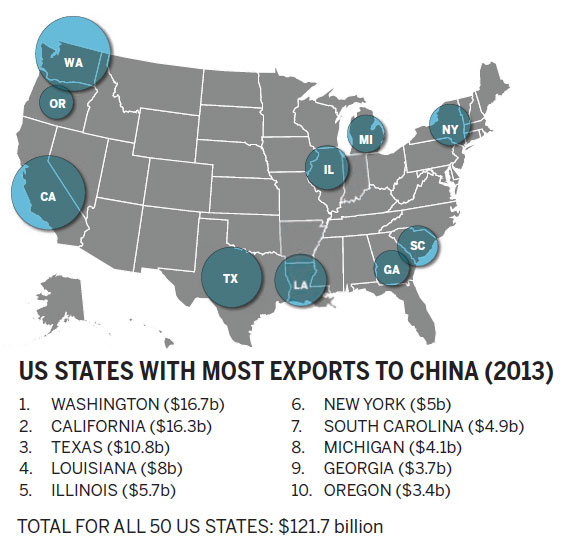
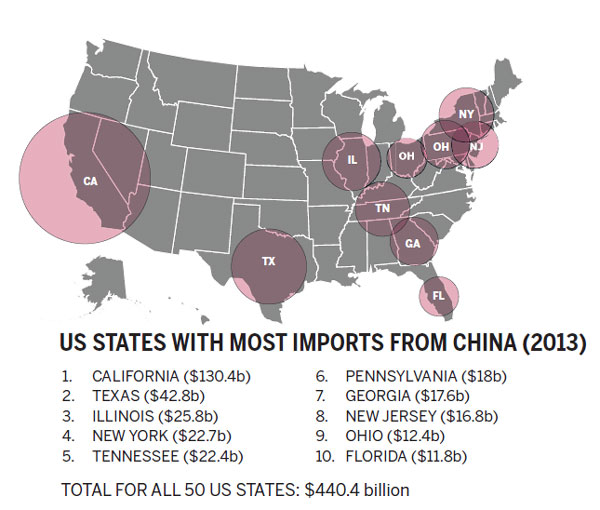
The states' efforts are naturally supported by the US government, as the Commerce Department recently concluded the 25th US-China Joint Commission on Commerce and Trade (JCCT) talks in Chicago.
Governors Rick Perry of Texas and Rick Snyder of Michigan have made several trips to China. Snyder has been there four times, and last month was in Guangzhou and Shenyang urging Chinese companies to set up shop in Michigan. Perry toured Beijing and Tianjin in September and had visited Shanghai four years prior.
Mayors get in on the act, too. Los Angeles's Eric Garcetti visited Beijing in November; Chicago's Rahm Emanuel was in China in 2013. Next month, Minneapolis' Betsy Hodges will travel to "City of Ice" Harbin for advice on increasing cold-weather tourism in her city.
China's kind of town, Chicago is
Chicago's landing the JCCT was a coup for an event that usually occurs in Washington. US Commerce Secretary Penny Pritzker, a Chicago native, and US Trade Representative Michael Froman hosted the Chinese government delegation, and for the first time, the JCCT schedule included events to facilitate private sector engagement.
"We had the opportunity to hear from our respective private sectors," Pritzker said Dec 18 on a press conference call. Pritzker said the two nations made progress on medical and pharmaceutical issues, and agreed to work together to combat illegal fishing and on the fair enforcement of China's anti-monopoly laws.
Thirty years ago, said Pritzker, US-China trade amounted to less than $5 billion. Today, it totals $617 billion. She said that 7.3 million Chinese are expected to travel to the US by 2021 under a new extended-visa policy, amounting to $8.5 billion per year for the economy and up to 440,000 jobs.
Pritzker and US Secretary of Energy Ernest Moniz will lead a mission to China next April to focus on industries supporting smart cities and smart growth, a visit Pritzker described as a "super trade mission to China".
Chicago is using some of its industrial muscle to compete with the great port cities in California, Texas and Washington state. China is Chicago's second-largest trading partner after Canada.
In December, Chinese real estate giant Dalian Wanda Group announced it would invest $900 million in a riverfront residential and hotel tower in Chicago.
When Emanuel visited China, he signed a gateway cities agreement with China's Ministry of Commerce that established sister-city relationships with Beijing, Shanghai, Tianjin, Qingdao, Shenyang, Hangzhou, Wuhan and Chengdu; those cities sent representatives to JCCT.
"Increasing opportunities for trade between Chicago businesses and their Chinese counterparts is critical to the continued growth of our city's economy," Emanuel told the Chicago Tribune.
"China is now our state's largest trading partner and the destination for more than one-fifth of Washington state exports," Kristi Heim, executive director of the Washington State China Relations Council, wrote in an e-mail to China Daily. "The value of Washington exports to China was $16.7 billion last year, nearly double the value of exports to the next largest market, Canada.
"One reason why exports continue to climb is that Washington has a great diversity of products that appeal to China's growing middle class, from airplanes to medical devices to seafood and fruit," said Heim. "E-commerce is now helping smaller companies find markets in China. Washington farmers sold tons of cherries to Chinese consumers earlier this year through online commerce sites in China and charter flights from Seattle to Shanghai."
Washington state in sweet spot
Heim said the "cherry charters" helped farmers find new markets for perishable fruit.
"We have seen great interest from Alibaba in expanding here," she said. "The company recently opened an office in downtown Seattle and plans to expand its engineering staff. Managers from Alibaba's Tmall have visited Seattle a number of times, and we've helped introduce them to local companies. They held a special promotion for Washington state featuring our governor, Jay Inslee, and brands such as Starbucks and Costco, Almond Roca and Washington wines and pears."
Costco has been selling its products in China on Tmall Global since October.
"Investment deals from China have mostly involved real estate, transportation and construction, but technology is an area where we expect to see growing interest and more deals in the next year," Heim said. "Education is also very popular, with new schools and education companies starting up here."
One project that has attracted Chinese investors is a waterfront development and 350-room hotel on Lake Washington, next to the Boeing factory in Renton. Another large project involves an investment by Shanghai Bi Ke Clean Energy Technology Co andDalian Xizhong Island Petrochemical Park.
The state is the largest exporter of all commodities to China of any US state. The top export products include civilian aircraft (Boeing's Commercial Airplanes division in Renton, Washington) and fruits, vegetables and grains, such as soybeans, wheat, apples, corn and potatoes.
Texas means business
"You may see that the future of the United States is the California model or the Texas model," James Chen, Asia-Pacific regional director for the Texas governor's office of Economic Development and Tourism, told China Daily, in reference to how states are approaching commerce. "Our major competitor is California. We are even doing better than New York now."
"Oil, gas, definitely here," Chen said of what the state offers Chinese companies. "High tech, maybe SiliconValley, and definitely Austin."
"We try to help with a site search," Chen said. "Most small to mid-sized companies benefit more from our help. They don't have a structured BD (business development) division."
"I receive an e-mail sometimes from the Guangzhou consulate referring companies that are interested in Texas," Chen said. "If a US company would like to go there, we share with them the contact to the Consulate General office in Houston."
Energy companies CNOOC, CNPC, PetroChina and Sinopec USA all do business in Texas.Telecommunications giant Huawei Technologies has its US headquarters in Plano.
Representatives of the China International Contractors Association, associated with China's Ministry of Commerce, visited Houston in November, for a meeting with the Greater Houston Partnership. The group represents 20 China State-owned enterprises, and Chen said they will return next year.
In 2013, with $10.8 billion in exports, China was Texas' fourth-largest export destination. The state's major exports are industrial and electric machinery, chemicals, plastics and mineral fuel.
Texas imported $42.8 billion worth of Chinese goods, making China second among the state's trading partners. The top imports include electric and industrial machinery, furniture, toys and iron or steel products. Chinese companies have spent $22.2 billion to acquire Texas companies in the last decade.
Motor City moves
Michigan's governor has visited China each year since taking office in 2011.
"We are already seeing significant Chinese investment in Michigan, but this is just the beginning of what we have to offer the China market," Snyder said in November.
Chinese money is helping Detroit to regain its past industrial glory. Chinese investment in Michigan has nearly doubled from $890 million in 2010 to $1.6 billion, mostly in the automotive industry, according to data compiled by Rhodium Group, a New York research firm.
"Major investments from China will leverage Michigan's industrial power," said Brian Connors of the Michigan Economic Development Corp. Connors told China Daily that about 10,000 jobs have been created from Chinese investments.
China Automotive Systems, based in Hubei province, is an auto-parts supplier. Its shares were listed on Nasdaq in 2004, and it now supplies power steering systems to Ford, General Motors and Fiat Chrysler.
"The headquarters of all the Big Three are around here, so definitely you have a lot of talent," said Haimian Cai, head of North American operations for China Automotive.
Michigan is home to 87,000 engineers, 70,000 R&D professionals and 75,000 skilled trades people - the largest available skilled labor force and the fourth-largest high-technology workforce in the US.
Chinese automakers are struggling with competition from foreign makers. Only around 40 percent of cars sold in China are national brands, and China's automakers must cope with consumers' preference for larger, more reliable and more luxurious cars.
China wasn't a factor in automaking until the late 1970s, while Detroit has been a car town for more than a century. That heritage has interested China, as more than 100 auto-related companies have set up in Michigan. Chang'an Automobile Group, which has a joint venture with Ford in China, is relying on its Detroit research center to develop the chassis for its higher-end vehicles.
"Automakers are now operating on a global scale, and we need to find where the power of purchase and decision is," said Cai, referring to Detroit.
Golden State strength
Los Angeles Mayor Garcetti recently visited Beijing to promote Hollywood, Disneyland and other Golden State treasures.
"Los Angeles is a global city and the American capital of entertainment, manufacturing and international trade," Garcetti said on his visit in November. "I look forward to a new level of exchange and partnership that will bring prosperity for everyone on both sides of the Pacific."
China is California's third-largest export destination, with approximately $16.4 billion in goods and services, according to the California Chamber of Commerce. Computer and electronic products make up about 31 percent of exports.
XLD Group, a US subsidiary of China-based Sichuan Xinglida Group, purchased the 1,004-room Los Angeles Airport Marriott for $160 million on Dec 16. In late 2013, XLD bought a 17-story Marriott hotel in Torrance, California, for $74 million.
The Chinese real estate developer Hazens Investment completed the acquisition of the Sheraton Gateway Hotel in Los Angeles for $96 million.
A Bay Area Economic Institute report said that China became California's top source of international visitors in 2012, with some 677,000 Chinese tourists spending almost $2 billion. Some of that business is reciprocal: the report noted that China is the No 2 country for Bay Area businesses abroad, with 795 affiliates.
San Francisco is now the third US destination for Guangzhou-based China Southern Airlines.
"China Southern Airlines will further accelerate friendly communications between China and the US, better meet the needs of trade development in Guangzhou, Wuhan and San Francisco, and speed up bilateral political, cultural and people-to-people exchanges," said Yang Lihuang, executive vice-president of China Southern Air Holding Co.
One Chinese official said Hangzhou, in Zhejiang province, is going to become the most attractive Chinese city for Americans, particularly Californians, to visit.
"First, American people love Chinese silk and green tea, and now they are welcome to visit Hangzhou, the cradle of silk and tea," said Zhao Hongzhong, the vice-chairman of the Hangzhou Tourism Commission.
"Hangzhou is the city that has the Chinese style with its West Lake and Grand Canal," Zhao said.
"Second, Hangzhou is a city full of business opportunity. Alibaba, now the world's second-largest Internet company, was born in Hangzhou city."
Some news broke during JCCT, as the US confirmed heavy import duties on solar products fromChina. Anti-dumping duties for Chinese goods were set as high as 165 percent as the US unit of German solar manufacturer SolarWorld sought to close a loophole that allowed Chinese producers to avoid duties from 2012.
While on the trade front there have always been suspicion and wariness between the countries about the dumping of products, currency valuations and sensitive technology, Chinese foreign direct investment (FDI) in the US is continuing apace.
China Ministry of Commerce officials predict an outbound FDI record of $120 billion globally for 2014, on track to soon surpass inbound flows.
Through September, China has invested $7 billion in 93 deals in the US, according to Rhodium Group.
California has 32 deals worth $1.9 billion; followed by New York, with 13 worth $813 million; and Texas with six deals valued at $218 million.
In 2014, the most deals have been in entertainment and real estate, $2.22 billion. Information technology has seen 16 deals with a value of $2.83 billion. Fourteen deals in health and biotech totaled $913 million, and 11 deals in automotive and aviation for $548 million.
Chinese FDI has totaled $82 billion from January to October worldwide, up 18 percent year on year. Growth was reported to be particularly strong in the third quarter.
Recent reforms in China have reduced approval requirements and red tape for Chinese firms investing overseas.
In December 2013, the State Councilabolished many restrictions and approval requirements for outbound FDI, which resulted in more lenient policies by the two main regulators, the National Development and Reform Commission and the Ministry of Commerce, Rhodium's Thilo Hanemann wrote in a Dec 1 report. Effectively, Chinese firms now need to register only with the two regulators if they invest less than $1 billion in low-risk economies.
China's global outbound FDI accelerated in the third quarter; Chinese firms spent $3.1 billion on FDI transactions from July to September, according to Rhodium. That includes Lenovo's acquisition of IBM's x86 server business.
A Ministry of Commerce report on Dec 16 said that outbound direct investment by Chinese enterprises could exceed inbound foreign direct investment for the first time this year. China's nonfinancial overseas direct investment (ODI) rose 11.9 percent to $89.8 billion during the first 11 months, while nonfinancial FDI was up just 0.7 percent to $106.2 billion.
Chinese investors have spent more than $3 billion on commercial property in the US over the past four quarters, making it the year's top sector.
Notable real estate deals were the Anbang Insurance Co's acquisition of the Waldorf Astoria Hotel in New York in October for $1.95 billion, and earlier this month, Bank of China's purchase of 7 Bryant Park, a Manhattan skyscraper, for a reported $600 million.
In Washington, though, lawmakers have pushed legislative measures that would significantly tighten reviews for foreign investment, in response to growing Chinese FDI. While there is goodwill with many deals, there also is some suspicion in Washington about the extent and type of Chinese investment.
Outside of FDI, traditional trade for goods and services between the US and China surged in October, according to the US Census Bureau. The US imported $45.2 billion in goods and services in the month, while exports reached $12.7 billion.
The figures for both countries were the monthly highs so far for 2014. The US saw exports jump by more than $3 billion in October, reducing its current account deficit with China by $3 billion to $32.6 billion.
Challenges remain
The trade relationship between the two countries still runs into road bumps, as the solar tariffs show.
The US House of Representatives passed a fiscal year 2015 appropriations bill on Dec 11 that, according to Sun Jiwen, spokesman for China's Ministry of Commerce, "violates the rule of fair trade and sends wrong signals. China expresses dissatisfaction and strong opposition to this."
In the bill, appropriations cannot be used to import processed poultry products made in China for Chinese meal programs in US schools.
Also, some US government departments are prohibited from purchasing information technology systems made by Chinese companies, and the issuance of commercial satellite licenses to China is not allowed.
"These clauses would not only affect normal business cooperation between companies of the two countries, but also damage the US' own interests," Sun said. "China urges the US to take substantial measures and correct its wrong practices, thus creating a good environment for the healthy development of China-US economic and trade relations.
Contact the writer at williamhennelly@chinadailyusa.com
Lu Huiquan in New York, Chen Weihua in Washington, May Zhou in Houston, Lian Zi in San Francisco, Pu Zhendong in Beijing and Reuters contributed to this story.
- 'Miss Leisure World' candidates play war game
- Metro use drops slightly as new fare hikes kick in
- Record passenger numbers expected for upcoming chunyun
- Children step out of Daliang Mountain
- 1,000 years on, the art of fish hunting is in safe hands
- National Stadium illuminated to greet New Year countdown

 Top 10 happiest cities in China 2014
Top 10 happiest cities in China 2014
 Children step out of Daliang Mountain
Children step out of Daliang Mountain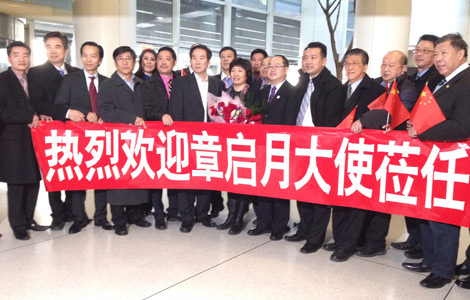
 New Consul General of China in New York arrives at JFK
New Consul General of China in New York arrives at JFK
 Missing AirAsia plane maybe at sea bottom
Missing AirAsia plane maybe at sea bottom
 Chinese artists get Times Square spotlight
Chinese artists get Times Square spotlight
 Yearender: Best selling Chinese films in 2014
Yearender: Best selling Chinese films in 2014
 Top 10 policy changes of China in 2014
Top 10 policy changes of China in 2014
 Families of MH370's passengers still hold out hope
Families of MH370's passengers still hold out hope
Most Viewed
Editor's Picks

|

|
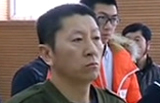
|
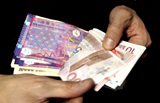
|

|

|
Today's Top News
Xiaomi's sky-high value also comes with potential obstacles
Bright lights for Chinese artists
Expiration dates on food probed
'New normal' focus for new consul general in NY
Bodies, debris from missing plane pulled from sea
Chinatown rallies to aid slain officer's family
Chinese FM: Against any cyber attack
China says no role in Sony hacking
US Weekly

|

|







